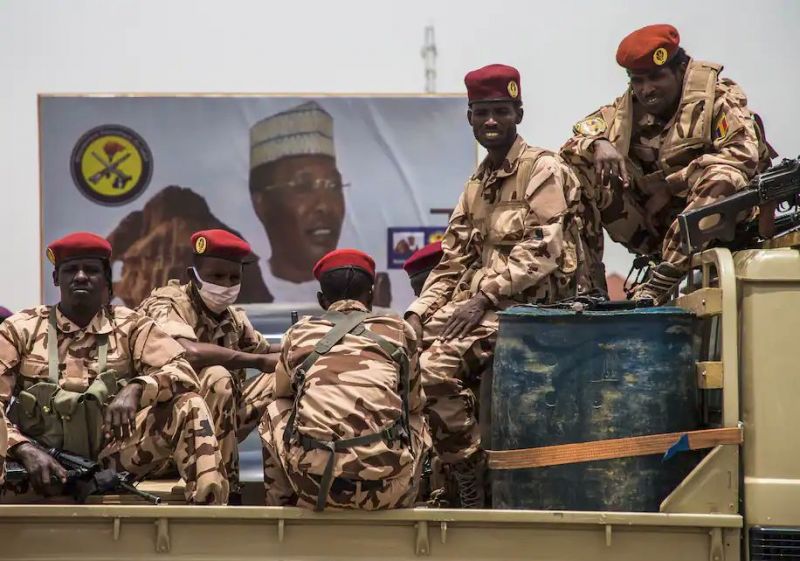
Chadian President Idriss Déby died on the battlefield on April 19. That’s hardly a common death for any country’s leader in modern times — and the story breathes fresh life into what has been, since colonial times, a cliche: the view of Chad as an endlessly warring country populated by ferocious fighters.
My research on armed violence suggests that Chad is indeed a country in which politics is conducted with weapons in hand — but not because of inherent national characteristics or a warrior culture rooted in tradition. Instead, Chad’s militarization is the product of a history made of rebellions and suppressions in which neighboring countries and the former colonial power, France, have never ceased to play a key role.
Until his sudden death, Idriss Déby’s political and military career reflected Chad’s militarized politics, and the global connections of political and military leaders. This man, who awarded himself the title of “marshal” just a few months before his death, had lived by the gun in both his domestic and international policies. Déby made himself an indispensable military ally to the West. He was well aware that his political survival depended at least as much on Paris and Washington, D.C., as it did on his homeland.
Déby’s career took many turns
Idriss Déby’s final moments may have been dramatic, but the career path he took in the armed forces is actually not unusual in Chad. Like other men of his generation, his political-military pathway was a winding one, with stints in both government forces and the rebellion. Like many Chadian soldiers, Déby received some of his training in France.
When Déby, with a professional pilot’s license obtained in France, returned to Chad in 1976, he initially supported President Felix Malloum, the general who had staged a coup the previous year. When civil war broke out in 1979, he joined Hissène Habré’s rebel faction, which opposed another rebel leader, Goukouni Oueddeye.
On June 7, 1982, Idriss Déby led Hissène Habré’s rebel forces as they took control of Chad’s capital city, N’Djamena. Déby was then appointed commander in chief of the Chadian National Armed Forces (FANT). Déby also made his mark fighting on the side of the government army, defeating pro-Libyan troops in northern Chad in 1983.
Tributes to Déby tend to veil the less glorious aspects of his military career. He commanded the army when it carried out brutal crackdowns between 1983 and 1985 on the self-defense movements, known as codos, that had formed in southern Chad. His forces tortured and executed codos activists, looted villages and massacred civilians.
After years of mobilization in Chad and abroad, Hissène Habré was finally tried and convicted. In 2017, the Extraordinary African Chambers in Dakar found Hissène Habré guilty of crimes against humanity, war crimes and torture. By lifting Habré’s immunity, Déby allowed the trial to take place, while skillfully maneuvering to avoid being questioned himself.
Déby also found himself on the side of the victims of repression. In 1989, Hissène Habré’s forces targeted and persecuted the Zaghawa. This was Déby’s own ethnic group, and his relatives and friends were murdered. Following a failed coup attempt to remove Habré from power, Déby headed up a rebel coalition that set up base in neighboring Sudan’s western province, Darfur. In 1990, he succeeded in taking power thanks to support from both Sudan and France, which in the end abandoned its ally Habré, who they believed had become too close to the U.S. Déby also built connections at the School of War (L’Ecole de Guerre), an institution for military higher education in Paris, in 1985 that served his subsequent political career well.
Déby became indispensable to France and the U.S.
As French President Emmanuel Macron noted, “France lost a brave friend”. Indeed, Déby remained a French ally. Established in the capital under Habré in 1986, the French military cooperation, Operation Epervier, only came to an end in 2014, replaced overnight by Operation Barkhane, a vast counterterrorist force in the Sahel and Sahara. During the rebel attacks on the capital in 2006 and 2008, the French army intervened discreetly but effectively to save Déby and his regime.
In 2019, the French conducted airstrikes against a rebel column. In 2021, Operation Barkhane’s resources were again diverted from their objective, the “war on terror”, this time to provide assistance to Déby’s army in the form of surveillance and logistic support.
Déby, a fine political strategist, made himself an indispensable ally to both France and the United States in the fight against terrorism in the Sahel and Sahara. He played the military card, making Chad an emerging regional power. Chad’s allies turned a blind eye not only to human rights abuses in the country but also to abuses perpetrated by Déby’s own army against civilians, both in Chad and in other countries in which it has intervened.
In a rushed succession, Déby’s son, Mahamat Idriss Déby, took power as the head of a transitional military council made up exclusively of military personnel who had been close to the former president. A few days later, Chadians took to the streets to protest what many political leaders and nongovernmental organizations called a “military coup d’etat”. Security forces repressed these demonstrations, killing at least nine people.
In rejecting this military transfer of power, these protesters remind us that Chad is not doomed to being a country of warriors. Against all odds, in the shadow of the military’s power, a civilian political alternative has formed.
Marielle Debos is associate professor in political science at the University of Paris-Nanterre, and a researcher at the Institute for Social Sciences of Politics (ISP). She is the author of Living by the Gun in Chad: Combatants, Impunity, and State Formation (Zed Books, 2016).
